President Yoweri Kaguta Museveni of Uganda has assumed a pivotal role in steering the quest for peace and stability in Africa’s Great Lakes region. On May 28, 2025, Museveni was handed the chairmanship of the Regional Oversight Mechanism (ROM) of the Peace, Security and Cooperation (PSC) Framework for the Democratic Republic of Congo (DRC) and the broader Great Lakes Region. The handover took place during the 12th high-level ROM summit at State House Entebbe, with President Évariste Ndayishimiye of Burundi passing on the instruments of power to Museveni for a two-year term.
A Critical Juncture for Regional Peace
The Great Lakes region, encompassing countries such as Uganda, Rwanda, Burundi, DRC, Kenya, Tanzania, South Sudan, and others, has long been plagued by cycles of conflict, cross-border tensions, and humanitarian crises. The PSC Framework, established in 2013 under the auspices of the United Nations, African Union, International Conference on the Great Lakes Region (ICGLR), and Southern African Development Community (SADC), was designed to address the root causes of instability, particularly in eastern DRC, through collective regional responsibility and cooperation.
At the summit, President Museveni emphasized that the region’s challenges are not insurmountable. He argued that the problems are well-understood by regional leaders and can be resolved with the right approach. “We now know the problems, and we can solve them. These are our people—Rwanda, Burundi, Eastern Congo, Tanzania, Kenya. In my opinion, these problems are easy to solve. What is difficult are the three mistakes: philosophy, ideology, and strategy,” Museveni stated, underscoring the need for homegrown leadership and solutions.
Warning Against Foreign Interference
A central theme of Museveni’s address was a caution against excessive foreign involvement in the region’s affairs. He asserted that while international support is valuable, foreign actors often inadvertently embolden internal divisions or prolong conflicts by failing to grasp the local context. “Because we know what the problem is, and it can be solved, but we must have the political will, and foreigners should limit their involvement, because foreigners are the ones who carelessly embolden the mistake. Then the mistake makers think that we don’t care about these internal groups. We don’t care about the region. What is important is our support,” Museveni said.
This call for limited foreign interference reflects a broader sentiment among African leaders that sustainable peace must be anchored in regional ownership and accountability. Museveni’s leadership is expected to prioritize local initiatives and strengthen mechanisms for dialogue, conflict prevention, and economic integration among member states.
Regional Cooperation and Commitments
The summit brought together heads of state and government representatives from Angola, Burundi, Congo-Brazzaville, DRC, Kenya, Rwanda, South Africa, South Sudan, Sudan, Tanzania, Zambia, and Uganda, as well as observers from the UN, AU, and ICGLR. The leaders expressed deep concern over the deteriorating security situation in eastern DRC and its grave humanitarian consequences. They reiterated their commitment to the PSC Framework, especially the principles of respecting sovereignty and territorial integrity and refraining from supporting armed groups.
Uganda’s ongoing bilateral and regional efforts, including joint military operations with the DRC against the Allied Democratic Forces (ADF) and infrastructure projects with neighbors, were recognized as vital steps toward fulfilling the region’s peace and development agenda.
Looking Forward
President Museveni’s chairmanship comes at a critical time when the region faces heightened insecurity and humanitarian needs. His tenure will test whether the PSC Framework can move from rhetorical commitments to practical, locally owned outcomes that address the underlying causes of conflict. The next ROM summit is scheduled for 2026, where progress on the revitalized Framework will be reviewed.
As Museveni leads the Great Lakes Peace Forum, his insistence on disciplined democracy, collective responsibility, and limited foreign interference signals a renewed push for African solutions to African problems. The coming years will reveal whether this approach can finally deliver the long-sought stability and prosperity for the Great Lakes region.

